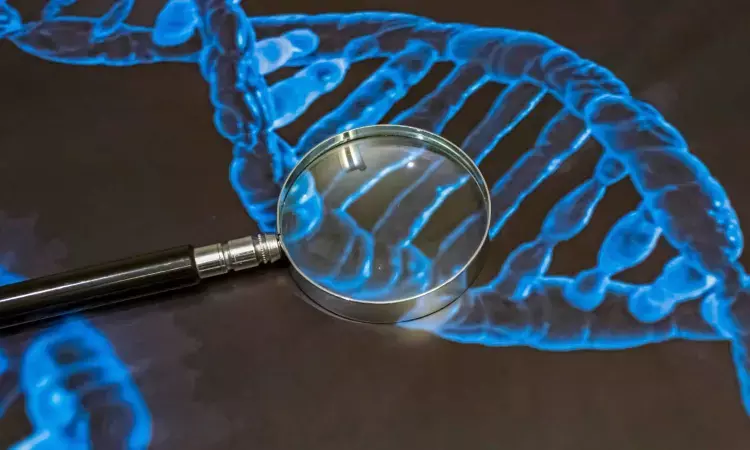- Home
- Medical news & Guidelines
- Anesthesiology
- Cardiology and CTVS
- Critical Care
- Dentistry
- Dermatology
- Diabetes and Endocrinology
- ENT
- Gastroenterology
- Medicine
- Nephrology
- Neurology
- Obstretics-Gynaecology
- Oncology
- Ophthalmology
- Orthopaedics
- Pediatrics-Neonatology
- Psychiatry
- Pulmonology
- Radiology
- Surgery
- Urology
- Laboratory Medicine
- Diet
- Nursing
- Paramedical
- Physiotherapy
- Health news
- Fact Check
- Bone Health Fact Check
- Brain Health Fact Check
- Cancer Related Fact Check
- Child Care Fact Check
- Dental and oral health fact check
- Diabetes and metabolic health fact check
- Diet and Nutrition Fact Check
- Eye and ENT Care Fact Check
- Fitness fact check
- Gut health fact check
- Heart health fact check
- Kidney health fact check
- Medical education fact check
- Men's health fact check
- Respiratory fact check
- Skin and hair care fact check
- Vaccine and Immunization fact check
- Women's health fact check
- AYUSH
- State News
- Andaman and Nicobar Islands
- Andhra Pradesh
- Arunachal Pradesh
- Assam
- Bihar
- Chandigarh
- Chattisgarh
- Dadra and Nagar Haveli
- Daman and Diu
- Delhi
- Goa
- Gujarat
- Haryana
- Himachal Pradesh
- Jammu & Kashmir
- Jharkhand
- Karnataka
- Kerala
- Ladakh
- Lakshadweep
- Madhya Pradesh
- Maharashtra
- Manipur
- Meghalaya
- Mizoram
- Nagaland
- Odisha
- Puducherry
- Punjab
- Rajasthan
- Sikkim
- Tamil Nadu
- Telangana
- Tripura
- Uttar Pradesh
- Uttrakhand
- West Bengal
- Medical Education
- Industry
Deep learning model from Nuchal Ultrasonographic Images accurately screens fetuses with trisomy 21

Trisomy 21 is the most prevalent chromosomal anomaly disorder that causes children's developmental delay and intellectual disability. Accurate screening for trisomy 21, which can provide an early opportunity for decision-making regarding reproductive choices in the first trimester of pregnancy, has been widely investigated in the past few decades. Currently, analyses of cell-free fetal DNA validation show high accuracy (up to 99%) in screening for trisomy 21. However, some studies have suggested that further cost-saving approaches should be explored, considering the potentially high cost of cell-free fetal DNA testing.
For decades, ultrasonographic images have been widely used for screening fetuses for trisomy 21, owing to the advantages of safety, convenience, and low cost. Fetal nuchal translucency (NT) thickness, measured in ultrasonographic images, has been used to screen fetuses with trisomy 21. Moreover, a 2021 study also found that some measured markers (eg, prenasal skin thickness, nasal bone length) were significant to trisomy 21 screening. However, these markers need sonographers’ elaborate annotations and measurements in ultrasonographic low-resolution images. Therefore, a better artificial intelligence (AI) approach should be explored to screen for trisomy 21 accurately.
Recent advances for quantitative medical image analysis using deep learning (DL) methods, particularly convolutional neural networks (CNNs), have shown remarkable performance, such as classifications based on computed tomography images and prognoses based on magnetic resonance imaging and computed tomography images.
In this study, authors focused on the challenge to investigate whether a noninvasive DL model could screen fetuses for trisomy 21 based on ultrasonographic images. They hypothesized that DL model would be able to screen fetuses for trisomy 21 accurately.
This diagnostic study used data from all available cases and controls enrolled at 2 hospitals in China between January 2009 and September 2020. Two-dimensional images of the midsagittal plane of the fetal face in singleton pregnancies with gestational age more than 11 weeks and less than 14 weeks were examined. Observers were blinded to subjective fetus nuchal translucency (NT) marker measurements. A convolutional neural network was developed to construct a deep learning model. Data augmentation was applied to generate more data. Different groups were randomly selected as training and validation sets to assess the robustness of the deep learning model. The fetal NT was shown and measured. Each detection of trisomy 21 was confirmed by chorionic villus sampling or amniocentesis. Data were analyzed from March 1, 2021, to January 3, 2022.
The primary outcome was detection of fetuses with trisomy 21. The receiver operating characteristic curve, metrics of accuracy, area under the curve (AUC), sensitivity, and specificity were used for model performance evaluation.
A total of 822 case and control participants (mean [SD] age, 31.9 [4.6] years) were enrolled in the study, including 550 participants in the training set and 272 participants in the validation set.
The deep learning model showed good performance for trisomy 21 screening in the training and validation sets. The deep learning model had better detective performance for fetuses with trisomy 21 than the model with NT marker and maternal age.
This diagnostic study presents a DL model for screening fetuses with trisomy 21. This model is a potential tool to improve the primary trisomy 21 screening based on ultrasonographic images for universal clinical application.
Source: Liwen Zhang, Di Dong, PhD; Yongqing Sun;JAMA Network Open. 2022;5(6):e2217854. doi:10.1001/jamanetworkopen.2022.17854
MBBS, MD Obstetrics and Gynecology
Dr Nirali Kapoor has completed her MBBS from GMC Jamnagar and MD Obstetrics and Gynecology from AIIMS Rishikesh. She underwent training in trauma/emergency medicine non academic residency in AIIMS Delhi for an year after her MBBS. Post her MD, she has joined in a Multispeciality hospital in Amritsar. She is actively involved in cases concerning fetal medicine, infertility and minimal invasive procedures as well as research activities involved around the fields of interest.
Dr Kamal Kant Kohli-MBBS, DTCD- a chest specialist with more than 30 years of practice and a flair for writing clinical articles, Dr Kamal Kant Kohli joined Medical Dialogues as a Chief Editor of Medical News. Besides writing articles, as an editor, he proofreads and verifies all the medical content published on Medical Dialogues including those coming from journals, studies,medical conferences,guidelines etc. Email: drkohli@medicaldialogues.in. Contact no. 011-43720751


